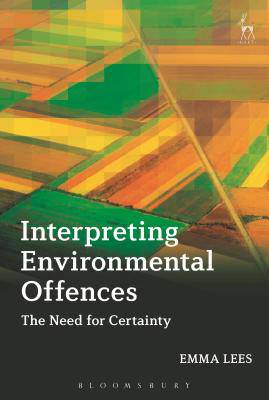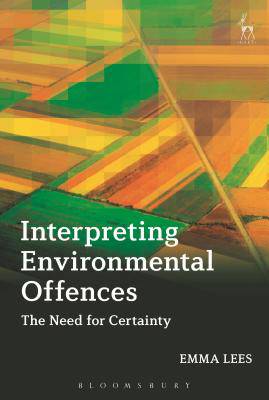
Je cadeautjes zeker op tijd in huis hebben voor de feestdagen? Kom langs in onze winkels en vind het perfecte geschenk!
- Afhalen na 1 uur in een winkel met voorraad
- Gratis thuislevering in België vanaf € 30
- Ruim aanbod met 7 miljoen producten
Je cadeautjes zeker op tijd in huis hebben voor de feestdagen? Kom langs in onze winkels en vind het perfecte geschenk!
- Afhalen na 1 uur in een winkel met voorraad
- Gratis thuislevering in België vanaf € 30
- Ruim aanbod met 7 miljoen producten
Zoeken
€ 93,45
+ 186 punten
Uitvoering
Omschrijving
This book analyses the interpretation of environmental offences contained in the waste, contaminated land, and habitats' protection regimes. It concludes that the current purposive approach to interpretation has produced an unacceptable degree of uncertainty. Such uncertainty threatens compliance with rule of law values, inhibits predictability, and therefore produces a scenario which is unacceptable to the wider legal and business community.
The author proposes that a primarily linguistic approach to interpretation of the relevant rules should be adopted. In so doing, the book analyses the appropriate judicial role in an area of high levels of scientific and administrative complexity. The book provides a framework for interpretation of these offences. The key elements that ought to be included in this framework-the language of the provision, the harm tackled as drafted, regulatory context, explanatory notes and preamble, and finally, purpose in a broader sense-are considered in this book. Through this framework, a solution to the certainty problem is provided.
The author proposes that a primarily linguistic approach to interpretation of the relevant rules should be adopted. In so doing, the book analyses the appropriate judicial role in an area of high levels of scientific and administrative complexity. The book provides a framework for interpretation of these offences. The key elements that ought to be included in this framework-the language of the provision, the harm tackled as drafted, regulatory context, explanatory notes and preamble, and finally, purpose in a broader sense-are considered in this book. Through this framework, a solution to the certainty problem is provided.
Specificaties
Betrokkenen
- Auteur(s):
- Uitgeverij:
Inhoud
- Aantal bladzijden:
- 256
- Taal:
- Engels
Eigenschappen
- Productcode (EAN):
- 9781509916030
- Verschijningsdatum:
- 1/11/2017
- Uitvoering:
- Paperback
- Formaat:
- Trade paperback (VS)
- Afmetingen:
- 155 mm x 231 mm
- Gewicht:
- 408 g

Alleen bij Standaard Boekhandel
+ 186 punten op je klantenkaart van Standaard Boekhandel
Beoordelingen
We publiceren alleen reviews die voldoen aan de voorwaarden voor reviews. Bekijk onze voorwaarden voor reviews.









